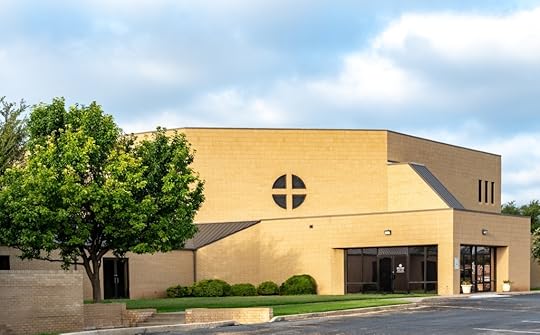Landon Coleman's Blog, page 3
October 20, 2024
“Think about These Things”

The following post was written by Jacob Way.
“Finally, brothers, whatever is true, whatever is honorable, whatever is just, whatever is pure, whatever is lovely, whatever is commendable, if there is any excellence, if there is anything worthy of praise, think about these things. What you have learned and received and heard and seen in me—practice these things, and the God of peace will be with you.” (Philippians 4:8-9)
You are what you eat is an expression I always heard growing up. “If you eat only cookies, you will become a giant cookie” is a way my mom would teach me to eat a more balanced and healthier diet. As a kid, imagining myself as a huge giant cookie was always a funny image. And I must admit, I have told my daughter this same thing and gotten a giggle as she imagined herself as one big strawberry.
However, this advice is not just a fun way for parents to get their kids to eat vegetables, but a truth about God’s created order—our diet does affect us. Eating only junk food will make us sluggish and sick. Eating nutritious foods, on the other hand, will give us more energy and health.
But this causal relationship between what we eat and its effect on us can also be said about the thoughts we put into our minds. Consider the wisdom of Solomon in Proverbs 23:7 (KJV), “For as he thinketh in his heart, so is he.” Meaning, there is a direct correlation between your thoughts and your character. What we think about throughout the day shapes us so much that we will become what we think.
This is why the Bible is filled with commands to “take every thought captive” (2 Corinthians 15:5) and to always “remember Jesus” (2 Timothy 2:8). This is why Paul encouraged the Philippians to likewise “dwell” only on what is good. He admonished them that if anything is true, right, honorable, good, excellent, or worthy of praise, they were to think of these things continually so that they would be obedient to Christ in all things.
But what do these commands actually mean, and how do we obey them? There are three simple steps we must take if we want to take every thought captive.
1) Be aware of the problem. You need to be mindful that, just like your diet, your thoughts shape you. They have a more significant influence than you can imagine. Every form of media, the things we read, or song lyrics we sing are forming us. What are those things communicating to you? What do they value? What are they causing you to think about? Is it sinful things or Godly things? What are they calling you to worship? Be careful. You are slowly being formed into the things you treasure. What would we hear and see if I were to play your Spotify playlist or scroll your Instagram? You are accountable for what you feed yourself.
2) Recognize what good is. What is the good that we are to dwell on? First, we must remember that we don’t define good. God does. We need to submit to His definitions, not our own. He is the Creator and Designer of all things, and this is His world. His ways are, therefore, always better. What does God call good? Himself (Exodus 34:6), His Word (Psalm 119), His Works (Psalm 92:4), and the good works prepared for us (Ephesians 2:10). These are all things we need to know better and think about more.
3) Dwell on the good. We could summarize Good as dwelling on God. This also includes all that He has ever said or done. What does this look like practically?
Dwelling on the good starts with God’s Word. We should commit to the discipline of memorizing Scripture. God’s Word is a living, active shaper of your soul. His Word encourages, comforts, convicts, brings clarity, is the source of wisdom, etc. For help doing this, I recommend an APP called “Verses.” This free app lets you select verses to memorize and helps you learn them in different ways. They have matching, fill-in-the-blank, and reciting. You’ll be amazed at how quickly these verses will become part of you in just a few minutes a day. We should also commit to the discipline of meditating on Scripture. David spends the longest chapter in the whole Bible (Psalm 119) talking about the goodness of God’s word and how he meditates on it day and night (Psalm 119:15). Christian meditation is very different from pagan meditation practices in eastern religions. The goal of meditation in Buddhism, for example, is to empty your mind. The goal of Christian meditation is to fill your mind. Dwelling on the good also involves worship. What are the songs you sing when you are bored? One way to dwell on the goodness of God is to regularly listen to worship songs. The right music can allow you to pour out your soul to the Lord as you go about your day. So be regular in listening to worship music – but beware – not all “Christian” music is created equal. Some modern-day worship songs sing about Jesus as if he were your friend or boyfriend, rather than your Lord and Savior. Avoid those songs and fill your mind with good, theologically rich songs. I recommend old hymns or contemporary artists like Sovereign Grace Music, Matt Boswell, Shane and Shane, and the Gettys.Dwelling on the good also involves understanding and celebrating the good works of our good God. Because everything was made by and for Jesus, we can dwell on the good that God has made us to do in our careers and passions. I can, for example, think about God’s design of economics as I prepare for class. World history becomes something to think about and even celebrate when I understand that the sovereign God has shaped history to bring about the redemption of His people for His glory. Philosophy becomes an engaging intellectual subject when I consider how Christ rightly teaches us the true, the good, and the beautiful.You are what you eat, and you are what you think. Therefore, I encourage you to dwell on the good in all these ways. Throughout your day, have Christ continually in your thoughts – who He is, what He has done, what He is doing, and what He will do. May His word be found in you as you worship Him through thought, action, and deed so that in all that we do, we may bring glory to God.
October 6, 2024
Why Do I Go to Church?

Before I get to the heart of this post, let me beat you to the punch and say what you’re probably thinking. I’m a pastor, so I go to church because it’s my job and I’m paid to show up on Sunday morning. Several years ago I actually wrote a post about this very issue: “I’m Glad It’s My ‘Job’ to Go to Church.” Several years down the road, I stand by that post. I’m still glad it’s my “job” to go to church.
The fact of the matter is, I was raised in a family that valued and prioritized going to church. As a young child, my parents made the decision about whether or not we would go to church. I thank God they made the right decision, even when I preferred to sleep in. When I was in high school, college, and seminary, and I had to make the weekly decision about whether or not to attend church, I still went. I went as a teenager. I went as a college student. I went as a seminary student. Through all those years, no one was forcing me to go or paying me to go. The routine I learned as a child carried over to my adult life.
Furthermore, I am firmly convinced that if the Lord called me out of vocational ministry and into another vocation, I would keep going to church. Obviously that theory would have to be tested and proved in the aforementioned circumstance, but I’m quite confident that church attendance would continue to be a priority for me, and by implication, for my family.
This gets to the heart of the issue on my mind with this post … Why do I go to church? Fundamentally, there are two reasons.
First, I go to church because I believe.
I believe the Bible really is inspired by the Holy Spirit and inerrant in content. I believe God created the heavens and the earth, and I believe human beings ought to recognize God as the Creator, Provider, and Sustainer. I believe God is supremely holy and worthy of worship. I believe that God (as God) has the right to call his people to worship, and I believe God has the right to set parameters on our worship. I believe human beings are sinful, wicked, and depraved, and I believe it is good for us to confess our sins to God. I believe that God, in eternity past, as an overflow of his infinite mercy, determined to save a people by his grace and for his glory. I believe that in the fullness of time, Jesus Christ was born of a virgin, born under the law, born to redeem sinners. I believe Jesus died as a sin-bearing substitute, was buried, was raised from the dead, and ascended to the right hand of the Father in heaven. I believe the Holy Spirit gives life to the dead in the miracle of regeneration. I believe Jesus will come again to judge the living and the dead. I believe eternity will be glorious for the redeemed people of God and eternally dreadful for those who do not believe in the name of God’s Son.
I go to church because I believe these things. Church is the place where all of these beliefs come together in worship, prayer, preaching, teaching, fellowship, and mission. I go to church because I believe.
Second, I go to church so that I will continue to believe. I know my heart is fickle and easily led astray. I know the human heart is prone to doubt and question and forget. I know the world pulls on the hearts and minds of all people – even believers. I know the enemy prowls around like a roaring lion seeking people to devour. I know that left to myself, I have no ability to come to Jesus and no ability to keep myself close to Jesus. I know that I need to be reminded of God’s character over and over again. I know that I need to be confronted by the Word of God and convicted about ongoing sin in my life. I know that I need to gather with the people of God to sing the praises of God, and I need this rhythm of worship to be engrained in the regular pattern of my life. I know my heart is prone to wander, prone to leave the God I love. I know that God’s design for the regular, consistent gathering of his people is a good designed intended to encourage me to press on in the faith until Jesus returns or he takes me home.
I go to church so that I will continue to believe. Church is the place where my faith is strengthened, encouraged, established, refined, and focused. I go to church so that I will continue to believe.
September 15, 2024
Relapse – Who Am I?

The following post is an excerpt from Hope to Win the War, by Jacob Way.
One of the most frustrating things about fighting the war against porn, is when you fail back into relapse. Relapse is destructive for many reasons. Relapse kills all the momentum you built. It demoralizes you and brings back terrible memories of addiction. Most devastating of all is that it triggers an identity crisis. You used to feel confident in who you were. You used to have a handle on sin. Now you aren’t sure.
Who are you? Who is the real you? Are you a recovering porn addict who has relapsed or a porn addict who has only momentarily been sober? Which is the real you? The victories, or the relapse? Are you mostly a sinner who is sometimes a saint? Or are you a saint who sometimes sins? Which are you?
To answer these questions, we must turn to God’s Word. The first truth we need to hold on to is the nature of our identity after we have come to Christ. Becoming a Christian is not just an identity we claim or a descriptor we give to other people—it is a fundamental transformation of who we are.
I cannot overstate the importance of this reality. Remember the words of Christ to Nicodemus: “No one can see the kingdom of God unless they are born again.” (John 3:3) We don’t enter the kingdom through a mystical ceremony or a change of lifestyle, but by being born again by the Holy Spirit. Our heart of stone is taken away, and we are given a heart of flesh. It is even more than a new heart. We must be made into a new creation. In Romans 6:6, Paul described how our new life begins with our death. When Jesus died on the cross, we died with Him. “For we know that our old self was crucified with him.” This was done “so that the body ruled by sin might be done away with that we should no longer be slaves to sin—because anyone who has died has been set free from sin.” (Romans 6:7)
The old you is dead. The you ruled by sin is dead. It was crucified with Christ and was buried in the tomb. As Paul says to the Corinthian Christians, “Therefore if anyone is in Christ, the new creation has come: The old has gone, the new is here!” (2 Corinthians 5:17)
When relapse happens, we shouldn’t be afraid that we are becoming our old selves again because our old selves are dead. It is not you. Sin no longer defines you, Jesus does. You are a redeemed child of the King. You still sin, but you are a saint. You have been completely forgiven and have Christ’s righteousness. You are holy because He is holy. The Christian life is about becoming who you already are. The old you doesn’t exist anymore. You aren’t a better version of yourself, but someone new altogether. This is not a metaphor or an allegory. It is as real as the empty tomb, proving Jesus has completely defeated sin. The reality of your new identity should change your life and how you live. You are a new creation, no longer a slave to sin. Sin has literally lost its control over your life. It is no longer your master. Your very nature is completely replaced. You were reborn as a free man or woman. You are new. People who are alive don’t live in tombs! Jesus buried that old you, so stop living in the grave. Live like you are alive because you are.

September 2, 2024
Why Work?

Work is a major part of life.
We go to school as children, youth, and young adults, all with the aim of being something and doing something when we grow up. We narrow this focus in trade school or college, selecting a skill or a major that will pave the way for our vocational future. We pay attention to economic reports that tell us about the unemployment rate, inflation, the cost of living, and real wages. We monitor 401Ks and Roth IRAs, all with the hope that one day we will be able to stop working. We find ourselves unable to work in our later years, and we feel like we’re just in the way, not able to contribute anything to anyone. We write obituaries in which we almost always detail what a person did for a living, either in the workplace or in the home.
Work is a major part of life – and death.
Work is the expenditure of mental and/or physical activity to achieve a desired result. Work may or may not involve compensation. Work may or may not be recognized with a title or a position. Work can take place in a family, in an economy, or in a government. Work can even be spiritual in nature. Work can involve work with your hands, and it can call for work with your mind.
We all recognize work when we see it and especially when we do it. However, many of us are confused about why we ought to work. The Bible offers the following motivations for work.
We work because God works. This is the testimony of Genesis 1-2, when God created the heavens and the earth. When God’s work was complete, he rested – not because he was tired or weary, but because his work was complete. While the work of creation came to an end, God continues to work at sustaining and upholding the world he created. As creatures created in God’s image, we work because God works.We work because God commands us to work. Again, this is inherent in the creation account where God’s working and resting becomes a pattern that human beings are called to follow. It is also made clear in the Ten Commandments where commandment four calls God’s people to work six days and rest one day. We often focus on the rest involved in the Sabbath, but the command is also a call to work. We work to provide for ourselves and our families. Idleness was a problem in the church at Thessalonica. The apostle Paul spoke plainly about the importance of work and the importance of earning a living so that you are not dependent on the work of others. Of course there are some who cannot work to provide for themselves, and they ought to be helped by the body of Christ. But those who can work, should work. We work so that we can give to others in need. Ephesians 4 presents the Christian with a motivation for work that goes beyond providing for oneself and ones family. There, the apostle Paul calls the thief to stop stealing and get an honest job. This involves a repentant thief providing for his own needs, but it also gives a repentant thief the ability to share with those who are truly in need. Our work allows us to be generous.We work to be salt and light. In the Sermon on the Mount, Jesus called his disciples to live as salt and light. To be effective, salt has to be exposed to that which might decay. Likewise, to be helpful, light has to be introduced into the darkness. Jesus clearly wanted his disciples to make an impact on the world around them. Those who work have the opportunity to do just that, whether at home, at church, or in the workplace. We work to contribute to the good of society. In the beginning, God called his image bearers to exercise dominion over creation. Theologians refer to this call as the “cultural mandate.” It was a call to make the world a better place through our work. Even in a fallen world this call remains. Ezekiel affirmed the importance of this call when he urged the Judean exiles to work for the good of their new home in Babylon.August 18, 2024
Breakfast Tacos, Coffee, and Discipleship

The following post was written by Jacob Way.
“Wait – what time on Friday morning?”
“6:00 AM,” my youth pastor replied.
So, I had heard him correctly. I was hoping I was mistaken.
He was talking to my friends group after church one day. He wanted to do an in-depth Bible study with us on Friday morning at our local Mexican restaurant. It would start at 6:00 AM and end at 7:20 AM, so we could all drive to school and be there before 8:00 AM.
I still had a hard time processing his request. It meant I would have to wake up at 5:20 AM to get ready for school and drive to the restaurant. That sounded really, really early for a 17 year old boy who stayed up too late, not doing homework and playing video games.
On the positive side, the restaurant had great breakfast tacos and free coffee. Additionally, something inside of me wanted to go. True, I would lose sleep. But I’d also gain something valuable—spiritual growth.
Little did I know how much those early morning breakfasts would impact me.
As we studied Scripture, it was one of the first times I was personally challenged to live out my faith. Over breakfast tacos and coffee, I was being shaped by the Word of God and a man who wanted me to grow up to spiritual maturity.
One morning, in particular, stands out in my memory. I remember my youth pastor telling us about his raise and asking how he should spend it. We all agreed that his TV was pretty old and his family deserved a flatscreen. He listened to us and asked us why we answered the way we did. In our minds, the obvious answer was “because you deserve it.” My youth pastor then spent the next few minutes talking about our responsibility to care for the poor – our responsibility to use what God has given us to love and bless others. We were all quiet. Someone cracked a joke to break the awkwardness. But the damage to our surface level Christianity had already been done.
Truths, doctrines, and ideas are essential to the Christian faith. But Christians are also called to action. I still think about the first time this reality dawned on me – over tacos and coffee.
I think back to that early morning Bible study, and I thank God for my youth pastor. I thank God for not allowing me to be stagnant and immature in my faith. I thank God for sending someone to help me grow in spiritual maturity. I thank God for using my youth pastor to challenge me. In hindsight, my youth pastor wasn’t uniquely qualified for this role. He was just willing to wake up at 5:00 AM to help a group of young men grow in spiritual maturity.
In the New Testament, we see this type of relationship between Paul and Timothy. Paul calls Timothy his “true son in the faith” (1 Timothy 1:2). As far as we know, Paul didn’t have biological children of his own, but that didn’t stop him from “adopting” a younger believer and raising him like his son. Paul poured all he had into Timothy. He instructed, encouraged, rebuked, and loved – just like a good father does – just like our good Father does.
In Paul and Timothy, we see a beautiful reminder that we need each other. We need mentors in our lives to help shape us. Our faith needs the investment of others if it is to grow. In turn, when we are grown up, we need to find someone else to invest in. We must encourage, correct, and love younger brothers. Everyone needs a Paul and everyone needs a Timothy. You need someone to pour into your life, and you need to pour into the life of another.
God’s desire is that his people grow to spiritual maturity. If you desire a Paul in your life, ask the Lord, who gives generously to all who believe. If you have been mentored, thank God. If you don’t have a person to pour into, pray for a Timothy.
We need each other to grow – and tacos and coffee are good, too.
August 4, 2024
To Post, or Not to Post – What Should We Do with the 10 Commandments?

BATON ROUGE, La. (AP) — Louisiana has become the first state to require that the Ten Commandments be displayed in every public school classroom, the latest move from a GOP-dominated Legislature pushing a conservative agenda under a new governor. (Read the AP story about the new law here. Read the AP story about the recent legal challenges to the law here.)
Maybe it’s just what the algorithms are sending to my social media feeds, but I’ve been shocked by the number of professing Christians who have taken to social media to lament and even ridicule the recent Louisiana law relating to the posting of the 10 Commandments. I understand non-Christian groups and individuals opposing the law, but I suppose I’ve been surprised by the number of evangelicals who think the new law is either silly, foolish, or harmful.
Most of the objections I’ve seen fall into one of two categories. One, some have argued that our public schools are not tasked with pushing a particular religious agenda, and posting the 10 Commandments clearly promotes a Judeo-Christian worldview. Two, others have argued that posting the 10 Commandments is a useless exercise in political posturing. These objectors have reminded us that our culture will not change because a poster is displayed in a classroom. Some have pointed towards the New Testament ethic as expressed in a passage like the Beatitudes, urging Christians to focus on living their faith rather than posting an Old Testament passage on the walls of a classroom.
How are we to think about these two objections?
In responding to the first objection – the idea that public schools should not be pushing a particular religious agenda – several things might be noted. One, it is entirely impossible for an educational institution of any kind to be morally, ethically, and religiously neutral. Some overarching worldview must prevail and govern the work of education. That worldview will either be Christian, or it will be secular, or it will be rooted in some other worldview – but there is no “neutral” approach to education. Two, a casual glance around our nation reveals that our schools are in fact in the business of promoting a particular worldview. That worldview includes a godless and naturalistic approach to science, a celebration of all things LGBTQ, and the assumption that therapists and counselors and teachers know better than parents. Make no mistake, our schools are not (and can not) be neutral places of learning.
In responding to the second objection – the idea that it’s a waste of time and money to display a poster than won’t change anything in the broader cultural landscape – several things might be noted. I suppose there are a few evangelical Christians out there (or a few devoted Catholics) who truly believe that posting the 10 Commandments in public schools is a good first step in “putting God back into our schools and our country.” I suppose a few of these folks really think that Christianity can be legislated and promoted by our government. I suppose these people are out there – I just don’t know any of them. At this point, in the 2024 version of the United States, I don’t know anyone who thinks that posting the 10 Commandments or putting prayer back in schools or anything else is going to magically turn back time and make American a “Christian nation.” I do know people who have realized that there is no neutral ground when it comes to legislating morality (and all legislation deals with morality), nor is their neutral ground when it comes to education (and all education deals with worldview issues). In the absence of anything resembling neutrality, and with the overwhelming push for anti-Christian worldviews coming from every corner of our culture, most of the folks I know simply want to have a say in the debate.
Additionally, when I hear professing evangelical Christians lament a law that requires the posting of the 10 Commandments, I want to remind them of the following truths we believe as evangelical Christians:
We believe the Scriptures of the Old and New Testaments are inspired by the Holy Spirit (2 Timothy 3:16, 2 Peter 1:21). The 10 Commandments are part of the inspired canon of Scripture, which means they are living and active and sharper than a two-edged sword (Hebrews 4:12-13), and they are useful for teaching, reproof, correction, and training (2 Timothy 3:17).We believe Jesus when he insisted that not an iota or a dot would pass away or be abolished from the Law and the Prophets (Matthew 5:17-18). Instead, Jesus claimed that the entirety of the Law and the Prophets was fulfilled in his life, death, and resurrection (Matthew 5:17). These statements were spoken immediately after the famous Beatitudes which are often referenced by those who object to the posting of the 10 Commandments. We believe Jesus when he taught his disciples that the entirety of the Law and the Psalms and the Prophets (the Torah, the Neviim, the Ketuvim) were pointing God’s people forward to Jesus, the Christ, the Messiah (Luke 24:25-27, 24:44-45). That means that when Christians read the Old Testament – and the 10 Commandments are a central piece of the Old Testament – we read Scripture that points us toward Jesus. We believe the apostle Paul when he said that the Law of God was holy, and righteous and good (Romans 6:12). Maybe I’m not giving the 10 Commandment objectors the benefit of the doubt, but the subtext of some of their objections seems to be rooted in a disdain for the Old Covenant Law itself. Some of the objections seem to imply that if we were going to post anything, it should be something from the New Testament. However, the apostle Paul – while refusing to be bound by the Old Covenant Law – still viewed the Law of God as holy and righteous and good. We believe the Law of God – when used rightly – both convicts us of sin and brings us to Christ (Romans 7:7, Galatians 3:24). Maybe I’m putting words and thoughts into Paul’s mind, and maybe his application of these verses would be other than what I expect in the 2024 version of the United States … but it seems reasonable to think that Paul would celebrate the public posting of something that might convict people of sin and lead them to Christ. Of course, the act of posting these things is not magical or automatic, but it does seem worth applauding. We believe that the Law of God as expressed in the 10 Commandments not only reveals the character of God (see Exodus 20:1-2 and Deuteronomy 5:1-6), but we also believe in what Protestant theologians have referred to as the “Third Use of the Law.” It seems entirely rational for Christians to celebrate the posting of a portion of God’s Word that serves to tell us about the very character of the Creator while also telling us about what the Creator wants in the lives of his creatures.July 14, 2024
The Love of God

The following post is an excerpt from Hope to Win the War, by Jacob Way.
One thing I struggled with during my pornography addiction was doubting if God still loved me. I could comprehend how God forgave my sins when I was younger, but what about when I deliberately rebelled against Him? What about when I consistently fall to pornography — does His love for me change?
One lie I believed was that God’s love is conditional— that I could become unlovable. Here is the truth of the gospel—God responds to our willful disregard for His love with grace, and mercy. He initiated the relationship, and He promised to love us. He forgives our unappreciativeness. He softens our calloused hearts and calms our anxious doubts. He reminds us that He loved us before the Milky Way was spoken into being. He died for us when we were sinners, the farthest away from Him that we could ever be. For love, the Father sent the Son. For love, the Son let Himself be nailed to a cross. For love, the Holy Spirit changed your heart. For love, God empowers you to live a life free from sin, a life to love and serve God and others.
God knew the sins you would commit before you became a believer, and He knew the ones you would commit after you became a believer. He knew all the sin we would ever commit and He still chose you. Jesus knew exactly how you would take Him for granted, and He still joyfully went to the cross. He knew and knows about your porn addiction, and His love has not changed. He isn’t surprised by the mess you’ve made. God doesn’t have buyer’s remorse. He’s not looking for a receipt to send you back. He doesn’t regret dying for you. He knew exactly what His relationship with you would entail, and He still chose to adopt you.
There is no wrath for God’s children. We have confidence, therefore, in God’s future love because there is only love for us in the future. Remember the logic of Romans. If He died for us as sinners, how much more can we be confident of His love as His children? This means that we are not demoted when we are disobedient. We are not unadopted even if we neglect our inheritance.
Maybe you have struggled to return to God because you think He won’t forgive you, or that He has to punish you first. This isn’t true. If you still fear punishment as a Christian, let God’s Word pour into your heart. “There is no fear in love. But perfect love drives out fear, because fear has to do with punishment.” (1 John 4:18) God’s love for you assures you that you don’t need to be afraid of the future. You don’t need to doubt God’s love. You can be confident that you belong to Him and will be with Him forever.

June 30, 2024
8 Odd Practices of Pastor Search Teams, and 3 Suggestions for Churches

I’m pushing close to twenty years of pastoral ministry in three different Southern Baptist churches. Over the course of my nearly two decades in pastoral ministry, I’ve talked to many pastor search teams. Some of these conversations were in depth and extended, and others were a single visit. Some of these conversations were initiated by me, and others were initiated by the pastor search team. In addition to my personal experiences with pastor search teams, I’ve walked with many friends through the process of applying, interviewing, and candidating for a pastoral position in a Southern Baptist church.
I don’t aim to be overly negative or hyper-critical, but I think the process of searching for a pastor with a pastor search team is often a deeply flawed process. In fact, if I’m totally honest, as I reflect on my interactions with pastor search teams, I find myself scratching my head in response to several realities that can best be described as insanity! Consider the following.
Lack of Training … It’s safe to assume that most senior pastors never train or prepare their congregation for the day they will leave. Thus, when the main leader steps away, the congregation is often left untrained and unprepared for the task at hand. To be fair, some churches are old hands at the search process after struggling with a revolving door of pastors who stay for short stints. Many of these churches would no doubt be resistant to the insight that might be offered by their current and soon to be departing pastor. Nevertheless, the fact remains that many churches are simply untrained and unprepared for the process of searching for a new pastor. Lack of Leadership … As I’ve written elsewhere, most Southern Baptist churches are not led by a plurality of elders (pastors, overseers). This means that when the “senior” pastor leaves, the church functionally leaderless. There is often a not-so-subtle tension that arises in the absence of a senior pastor, and that tension centers on the question of who is in charge during a time of transition? Is it the by-laws? The deacons? A committee? The staff? As I’ve talked to pastor search teams I’ve often discovered that the church itself isn’t quite sure about who’s actually in charge during the transition. This leadership vacuum tends to create uncertainty during a transition.A Popularity Vote … In a typical Southern Baptist church, the pastor search team is constituted through a democratic, congregational vote. Without being pessimistic or jaded or skeptical, I can assure you that these votes often come down to popularity and visibility. People are more likely to vote for people they know than people they don’t know. Visibility in the church and standing in the community play a big role in who is placed on these teams. Few vote for people on the basis of doctrinal depth or managerial experience. Most simply vote for people they know and like. The result is a pastor search team that may or may not be qualified to make a monumental decision like calling a new senior pastor to lead a congregation.Flawed Surveys … One of the realities that always surprises me is a pastor search team conducting a poll of the congregation to see what they want in their next senior pastor. The oddest categories are included in these polls, many of which have nothing to do with the biblical requirements for a pastor (elder, overseer). Sometimes the congregation wants a carbon-copy of the last pastor, and this is usually a recipe for disaster. Other times the congregation wants the polar opposite of the last pastor, and this too is usually a recipe for disaster. Worst of all, this kind of polling can create a sense of entitlement among members who assume the pastor search team will only consider candidates who meet a certain profile. Doctrine and Dollars … One of the most common mistakes made by Southern Baptist pastor search teams is waiting to discuss doctrine and pay at the very end of the interviewing process. Practically, this is incredibly foolish. These two issues are often black-and-white, deal-breaker-type issues for pastors and search teams. Either the candidate is a doctrinal fit, or he isn’t. Either the candidate is willing to accept a certain salary, or he isn’t. Saving these issues for the end of the search process can result in lots of wasted time as both parties delay important conversations. It can also result in super-awkward conversations when everything in a long interviewing process gets derailed at the last minute by doctrine or dollars. Mysticism … In my personal experience, one of the most amusing aspects of pastor search teams is their tendency to approach prayer as a mystical, magic eight ball. All pastor search teams pray for God’s guidance. However, rather than praying for guidance and relying on Scripture and the collective wisdom of the team, most pastor search teams tend to look for signs and coincidences that make God’s will clear and obvious. For example, I’ve had pastor search teams find “confirmation” in shared birthdays, common hometowns, similar names, and shared hobbies. Rather than looking for a biblical qualified candidate, many are looking for some mystical sign that will prove God is leading the search team to a particular candidate. Unanimity … One of the oddest practices of pastor search teams is the common preference for a unanimous decision. To be fair, not all pastor search teams require a unanimous decision to move forward with a particular candidate – but many seek unanimity. To give a personal example, in 2009 I had multiple meetings with a pastor search team from a county-seat First Baptist Church. They had ten members on the team. Their final vote for me as a candidate was nine “yes” and one “maybe.” This team allowed that one maybe vote to derail the entire search process, essentially allowing that person to decide on a particular candidate. They politely told me “no,” and they started their search over from scratch. Maybe it’s just me, but it seems odd that a pastor search team would allow one person to determine the course of the entire team on such a monumental decision. Ingoring the Staff … A final curiosity with pastor search teams relates to those teams who are serving a congregation that has multiple ministerial staff in place. Most of the time, very little concern is given to the make-up of the staff and whether or not a particular pastoral candidate would work well with the staff as currently constituted. My experience suggests that most pastoral search teams view the pastor as the all-important staff member, which means they view any current staff as entirely disposable. It is not uncommon for pastor search teams to suggest that an incoming pastor could – or even worse, should – fire current staff members. Rather than seeking a pastor who would fit well with the staff, most pastor search teams assume it’s the staff’s job to fit with the pastor – or else.These are a few of the common problems that arise with pastor search teams in Southern Baptist churches. To be fair, not all search teams make all of these mistakes, but most make at least a few, and some make all.
In response to these mistakes, I think churches can do several things to alleviate these problematic practices. By way of positive encouragement, here are some ideas that may help a congregation when it comes time to find a new pastor.
Succession Plans … Obviously, pastoral succession can go wrong in many different ways. Some outgoing pastors may talk about succession, but then they may delay retirement year after year leaving everyone in limbo. Others may singlehandedly handpick a successor without consulting the leadership of the church or considering the fitness of their chosen successor. However, when done rightly, the idea of pastoral succession can actually be a great help to the life and health of a church. If a good, godly pastor can guide his congregation through the search process and then hand the baton to a chosen successor, the jarring transition can become remarkably smooth.Search Firms … I have plenty of reservations when it comes to pastor search firms. I think they can be narrowly focused on a particular kind of candidate. I think they can fail to appreciate the unique DNA of a particular local church. I think they can struggle to grasp cultural realities that are vastly different in different parts of the country. However, these firms are trained, experienced, and well connected to help in the process of a church finding a new pastor. I think many churches would find the cost of a pastor search firm to be well worth the expense, especially when that firm works alongside of (not in place of) the leadership of a particular church.A Plurality of Elders … When it comes to finding a new senior pastor, I think the best thing a church can do is implement a plurality of biblically qualified pastors (elders, overseers). This is an obviously biblical practice, and one that has great practical benefit for a local congregation. When a church has a healthy, functioning plurality of pastors (elders, overseers), the absence of a senior pastor does not create a massive leadership vacuum in the church. A plurality of elders can also help ensure that the right people will be making the most important decisions in the life of a church. Additionally, a plurality of elders provides the best support team for a new pastor.If you are a pastor going through the process of applying, interviewing, and candidating at a church, check out Pastor to Pastor for more practical advice about the pastor search process, as well as advice for your new ministry!

June 26, 2024
A Regular Pastor’s Diagnosis of the SBC in 2024

Landon Coleman is the pastor of Immanuel Baptist Church. Immanuel affiliates with the Southern Baptist Convention and the Southern Baptists of Texas Convention. Immanuel also works closely with the Baptist General Convention of Texas through the work of BSM at UTPB, and Immanuel is part of the Pillar Network.
At the outset of this post, let me make a confession that for some will taint the rest of the post – I did not attend the Annual Convention of the Southern Baptist Convention in Indianapolis. My church (Immanuel) had VBS that week, and I stayed home to help with everything that’s involved with VBS at our church. Despite the fact that I spent the week tucked away in west Texas leading a “Jungle Journey” and getting slimed because the girls won the missions offering, I was able to watch most of the Annual Convention via livestream – a technology for which I am thankful.
With that disclaimer up front, here’s my diagnosis of the SBC in 2024.
Southern Baptists are Evangelistic … The work of the IMB in sending missionaries and the work of NAMB in planting churches are really quite remarkable when placed in the broader landscape of conservative evangelicalism in 21st century. I am not an IMB or a NAMB apologist, and I wouldn’t try to defend everything about either organization. However, both are out front helping Southern Baptists focus on evangelism, missions, and church planting. Whatever else you might say about the SBC, we have been concerned about the Great Commission from our founding, and cooperating to take the gospel to the ends of the earth remains at the center of our convention of churches. Southern Baptists care about missions. Southern Baptists are Cantankerous … After the convention kicked off, it didn’t take long for a palpable rage to build about a race car with NAMB branding. There were all sorts of questions and accusations about the money spent on such a display, but my understanding is that the car was a faux-rental that likely cost less than other less flashy displays. Another example of our cantankerous nature is the (ridiculous) process of passing resolutions. Personally, I think this is an old relic of SBC life that should pass from the scene. Nevertheless, it’s part of the annual convention, and it reveals our eagerness to quibble over minutia and non-binding words. Last, if you still don’t think we’re cantankerous, get on Twitter during the 2025 convention and search #SBC.Southern Baptists are Courageous … Speaking of resolutions, in Indianapolis the SBC issued a resolution (a non-binding statement of belief) regarding the use of IVF as a reproductive technology. You can find the resolution online here, and you can see how the media reported on this resolution with a simple Google search. My point isn’t to argue for or against the resolution, only to point out that the SBC was willing to make a statement about something controversial – even among people who attend Southern Baptist churches. In making this statement, the SBC spoke on an issue that has drawn both enemy and friendly fire. Rather than simply speaking for Southern Baptists, the convention was willing to also speak to Southern Baptists on a controversial issue. That takes courage. Southern Baptists are Divided … Some amount of division is inevitable (and maybe even healthy, if expressed rightly) in a big tent convention like the SBC. Several examples could be noted, but perhaps the most obvious example is the presidential race in Indianapolis. More than I remember in previous years, it was a crowded field of candidates, each speaking for a unique constituency within the SBC. The parliamentary process for the presidential election even resulted in a situation where a large number of “reformed” leaning Southern Baptists were supporting a candidate who has coauthored a book opposing reformed soteriology. Denominational politics makes strange bedfellows, indeed. Southern Baptists are Complementarian … At the 2023 Southern Baptist Convention in Anaheim, the messengers overwhelmingly voted to uphold the removal of Saddleback Church and Fern Creek Baptist Church for issues relating to the question of complementarianism and egalitarianism as it relates to the pastoral office. This year, 92% of messengers voted to remove FBC Alexandria – a church with significant history and significant resources. These “removals” are in essence votes to declare that a particular church is not in “friendly cooperation” with the Southern Baptist Convention. And all of these votes centered on questions of whether or not the New Testament allows women to hold the office of “pastor / elder / overseer.” These votes clearly indicate that the vast majority of Southern Baptists are complementarian in their ecclesiology. Southern Baptists are Educated … At each annual meeting of the SBC, a presentation is given to update the messengers on the health and the work of our six Southern Baptist seminaries – Southern, Midwestern, Southwestern, Southeastern, New Orleans, and Gateway. These six institutions exist to educate men and women who are preparing for vocational ministry both in the United States and on the mission field. It is inevitable that the health of any one of these schools may suffer at any given point in time. However, when you compare the health of these six schools to the broader landscape of theological education in the United States, all six are doing remarkable work. In particular, the stories of Southern Seminary (the largest and the flagship seminary) and Midwestern (the fastest growing seminary in the country) continue to impress. Southern Baptists are Confused … The glaring example of confusion within the SBC relates to ecclesiology – how should a church be structured and rightly put into order, who can rightly bear the title “pastor / elder / overseer,” and who can rightly function as a “pastor / elder / overseer.” As stated above, the votes to remove Saddleback, Fern Creek, and FBC Alexandria reveal a broad consensus on a complementarian position. However, the failure of the Law Amendment to garner 66% of the needed vote for ratification seems to suggest a different story. How a messenger could vote for removing the previously listed churches while also voting against the Law Amendment is baffling, to me. To be far, the Law Amendment only fell 4% short of the needed vote, which means 61% of the messengers – not an insignificant majority – were in favor of affirming the Law Amendment. Nevertheless, for various reasons, confusion regarding ecclesiology remains an issue in our convention. Southern Baptists are Searching … In particular, Southern Baptists appear to be searching for an identity – that one thing that will unite us as a cooperating convention of churches. Some appeal to history and insist that the identity of the SBC must be built on cooperation, missions, and partnership in the Great Commission. This is a noble view, but it has one flaw in the present cultural context. The aim of missions is the planting of churches, and if Southern Baptists can’t agree on basic ecclesiology, our continued partnership will be on thin ice. Others appeal to one of our Baptists distinctives as a common source of identity – the autonomy of the local church. After all, the SBC is a “convention” of churches, not a top-down denomination. These voices are hesitant to make clear statements about our doctrinal convictions (hence, the failure of the Law Amendment) because they feel like it is not the place of the SBC to “tell” churches how to operate. To be fair to this view, they are right. It is not the SBC’s job to tell churches what to do. I fully embrace the autonomy of the local church. However, it is well within the prerogative of messengers to define the parameters of “friendly cooperation.” We already do this with a host of issues (ie, credo-baptism). The SBC cannot mandate that churches embrace a consistently complementarian ecclesiology, but they certainly can draw a binding boundary for establishing cooperation. This is no violation to local church autonomy. Churches who disagree with the agreed upon boundary are free to unaffiliate with the SBC (although it seems most prefer to force the SBC’s hand by making the messengers vote on the matter, thus giving the church an odd kind of “martyr” status). Still others are appealing to a confessional identity as the unifying force within the SBC. This is the view I hold, and I think it is entirely compatible with the previous to positions. The Baptist Faith and Message (2000) doesn’t say everything a statement of faith might say, but it does say a good bit about the faith and practice of Southern Baptist churches. This confessional agreement was the motivation behind the Law Amendment – a simple desire for doctrinal unity among Southern Baptist Churches. If the SBC could agree on confessionalism as a unifying factor in our convention, this unity would only serve to uphold the importance and the urgency of missions, and this unity would be no threat to the principle of local church autonomy.June 16, 2024
Our Words Reveal Where We Are From

The following post was written by Jacob Way.
“But sexual immorality and all impurity or covetousness must not even be named among you, as is proper among saints. Let there be no filthiness nor foolish talk nor crude joking, which are out of place, but instead let there be thanksgiving.” (Ephesians 5:3-4)
I grew up in Dallas, Texas. One thing about Dallas is that it is not stereotypical Texas. We don’t have accents, and we don’t wear cowboy boots. Then, I moved to Lubbock and quickly learned I was not in Dallas anymore. I was almost in a new country altogether.
We could wear blue jeans on Fridays at the school I taught in. So that first week, I wore jeans and my favorite pair of Converse high tops. Right when I walked through the door, all of my male colleagues were aghast. They kept looking at me, down at my shoes, and back at me. Finally, they asked, “Where are your boots”? I didn’t want to lie, so I said I had none. Then the history teacher said, “Well, there’s a Cavenders down the road.” And that was that.
Pretty soon, I was wearing boots on Fridays. However, even my boots could not convince people I was from West Texas because my non-accent always revealed the truth. For example, when I said the word oil, I would say it like you said in your head: oi-uhl. But in West Texas, it is one syllable pronounced ole. Everyone, I mean, everyone said ole. No matter who I was talking to, whenever the word oil came up, it was obvious that I was not from West Texas. Therefore, no matter what I wore, my words always revealed where I was from.
In the same way, our speech reveals who we serve and what path we are on. We know from Ephesians 2:2 that before Christ, we all “once walked, following the course of this world, following the prince of the power of the air.” This means that we were all following Satan in the path of darkness, continually sinning and blaspheming God. But God, in his mercy, made us alive in Christ. He transferred us into His kingdom and made us co-heirs with His Son. Our identity has fundamentally changed. As Jesus said, we have been born again.
In the book of Ephesians, Paul wrote about the speech of believers. Not only are we accountable for the words we say, but our words also reveal who we are and where we belong. Thus, Christians are not to partake in “coarse joking, obscenities, or foolish talk.” (Ephesians 5:4). Not only are these words sinful, but they are also “improper for God’s holy people.” (Ephesians 5:3).
Paul takes his instructions even further in Ephesians 5:11, saying that a believer should “have nothing to do with the fruitless deeds of darkness.” Don’t flirt with immorality or even participate a little via dirty jokes and slander. Completely cut that kind of speech out of your life.
When a Christian talks and acts like people following Satan, it makes no sense. We are essentially talking like we are from Earth even though we have been born of Heaven. We are Christians, talking like non-Christians. Brother and sisters, may this never be!
Based on our continual thanksgiving and praise to God, people should know we are not from this world. They should hear your speech and see that you are born-again from Heaven. Therefore, live and talk like where you are from.



